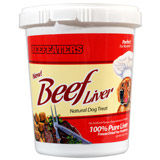The Causes of Bad Breath (Halitosis) in Dogs
If your dog has bad breath (halitosis) it is reason for concern. Not only is the odor unappealing, but it may also be a sign of an underlying problem. There are a variety of conditions that cause bad breath in dogs that warrant investigation. The solution may be simply providing effective dental care or perhaps, more seriously, an underlying gastrointestinal problem.
What Causes Bad Breath?
In most cases bad breath (halitosis) in dogs is caused by gum or dental disease. Small dogs are especially prone to dental problems such as tarter and plaque buildup warranting special attention to these areas. If after proper dental attention the problem does not resolve, further investigation is needed. Bad breath results from the accumulation of bacteria most often in the mouth, but may also occur in the lungs, liver, kidneys, and gastrointestinal tract. A serious underlying problem may be present which requires prompt medical investigation and treatment. If your dog’s bad breath is persistent he or she should be taking to a veterinarian for examination and testing.
Treatments for Bad Breath in Dogs
Oral Care
Daily oral care is needed to prevent plaque and tarter buildup. There are many great, natural products on the market, such as Leba III Dog Dental Spray and Triple Pet All Natural Toothpaste
and Triple Pet All Natural Toothpaste (Only use toothpaste formulated for dogs as human formulas may upset his stomach) that provide for optimal, natural oral care. There are also brushless, chewable toothpaste's available such as Ark Naturals Breath-Less Brushless Toothpaste S/M
(Only use toothpaste formulated for dogs as human formulas may upset his stomach) that provide for optimal, natural oral care. There are also brushless, chewable toothpaste's available such as Ark Naturals Breath-Less Brushless Toothpaste S/M . Your dog may require a specialized cleaning by a professional if all methods still result in continuing tarter and plaque buildup.
. Your dog may require a specialized cleaning by a professional if all methods still result in continuing tarter and plaque buildup.
Change of Food
If your dog’s diet is contributing to halitosis, change his diet to easily digestible food that is of high-quality
Chew Toys
Make available chew toys, such as Terrabone Dog Treat Fresh Breath Regular Value Pack , that naturally clean tarter and plaque from your dog’s teeth.
, that naturally clean tarter and plaque from your dog’s teeth.
Signs of Concern
Observe your dog’s drinking habits. If he has been drinking more than usual and urinating frequently, accompanied by fruity, sweet smelling breath, this may be a sign of diabetes.
An indication of kidney disease is breath that smells of urine
Foul breath accompanied by yellowed whites of the eye, vomiting, decreased appetite could indicate a problem with the liver.
Featured Products




























